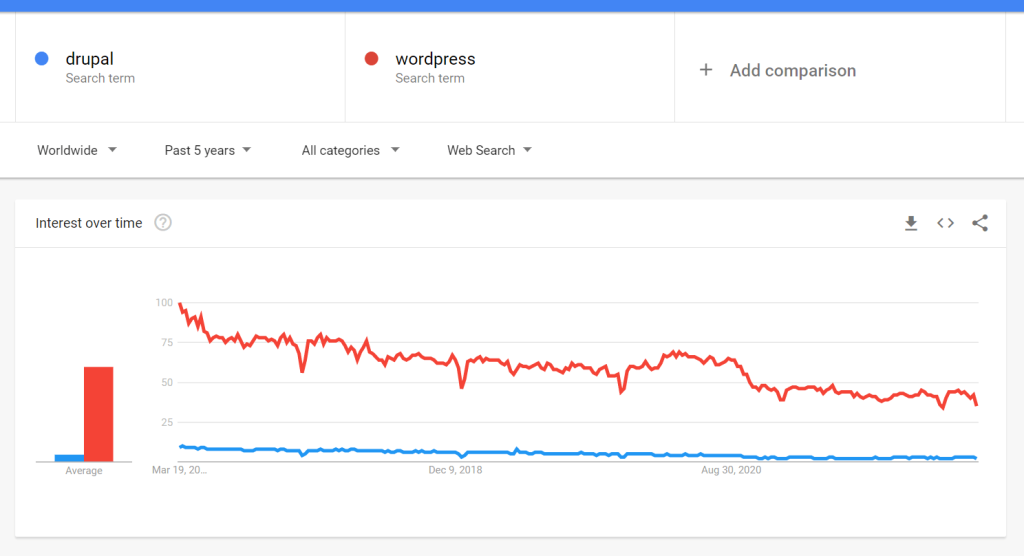Are you comparing Drupal vs WordPress? Are you perhaps thinking about which platform to use for your new website?
If that’s the case, then you will be amazed at how easy it is to choose one. On the other hand, it’s understandable why you’re confused (both are good options).
Let’s get to know each of them in this article. I’ll bet that even before you reach the end of the article, you will already have a good idea of which one is the best to use in your case.
Drupal vs WordPress: The Obligatory Numbers Comparison
WordPress is definitely the world’s most popular content management system. It was launched as a simple blogging platform in 2003. In 2022, it has now over 64% market share.
Some of the big-name brands that use WordPress include:
- Microsoft news
- TED Blog
- TechCrunch
- Playstation Blog
- The New York Times Company
- Mozilla Blog
- CNN Press Room
In terms of plugins and themes, WordPress has:
- More than 59,000 plugins
- More than 11,000 themes (in ThemeForest alone)
Drupal is an open-source content management system that was created in 2001. The “open-source” part is already a clue to the major users of Drupal, which accounts for 1.3% of all websites.
Some of the big-name brands that use Drupal include:
- Homedepot
- US Internal Revenue Service
- Cambridge
- Tesla
- The European Commission
- NASA
In terms of modules (plugins) and themes, Drupal has:
- More than 48,000 modules
- More than 3,000 themes
Looking over at Google Trends, you can see how far the interest is in WordPress compared to Drupal.

The interest in WordPress though is falling down compared to the stability Drupal is showing.
But the increasing market share of WordPress might signify this:
Fewer people are searching for it not because the interest is declining — but because people are already aware of it and are choosing it automatically.
Drupal vs WordPress: The War of Benefits
Getting right to the point, let’s discuss the reasons why people choose one over the other:
Benefits of WordPress over Drupal:
- Easy to use: This is the best benefit WordPress got over Drupal. WordPress is user-friendly and easy to use for those who don’t know anything about web development.
- More affordable down the road: WordPress also has more built-in features than Drupal, which decreases the cost of users hiring developers to assist them. WordPress developers are also generally cheaper than their Drupal counterparts.
- Extensive plugins and themes: WordPress has so many plugins and themes making it easy for a regular guy to make his website gorgeous without spending so much on a developer.
Benefits of Drupal over WordPress:
- Built-in control system: Drupal allows extensive access controls or user permissions. You can practically create new roles with each individual distinct permissions.
- Better taxonomies for data handling: Drupal is more flexible when it comes to taxonomy (refers to how you group related content together). Drupal is better at handling large amounts of data compared to WordPress.
- Multilingual feature: Drupal has a multilingual function built into its core. In contrast, you need to use a third-party plugin with WordPress.
- Lockdown security: Hands down, Drupal has one of the most serious security features (which is likely many government institutions use them instead). Drupal is also more transparent in terms of security (with regular security reports) than WordPress.
Drupal vs WordPress: How to Choose Easily
The fact that you’re here means you’re confused about whether to use Drupal or WordPress. Well then, let me simplify this for you.
Choose Drupal if:
- You want to build a website with complex data organization.
- You know web development and you’re willing to code it yourself.
- You have a massive budget for building a Drupal website.
Choose WordPress if:
- You want to set up a website as fast as possible.
- You want to save as much money as you can while still having the best website.
- You want to create a website yourself and you don’t know anything about web development.
Whether it’s Drupal or WordPress, there will always be pros and cons to each. Fortunately, there is always a way to get around each cons.
So which platform are you going to use for your website? What made you choose it over the other? Share your thoughts in the comment section below.

